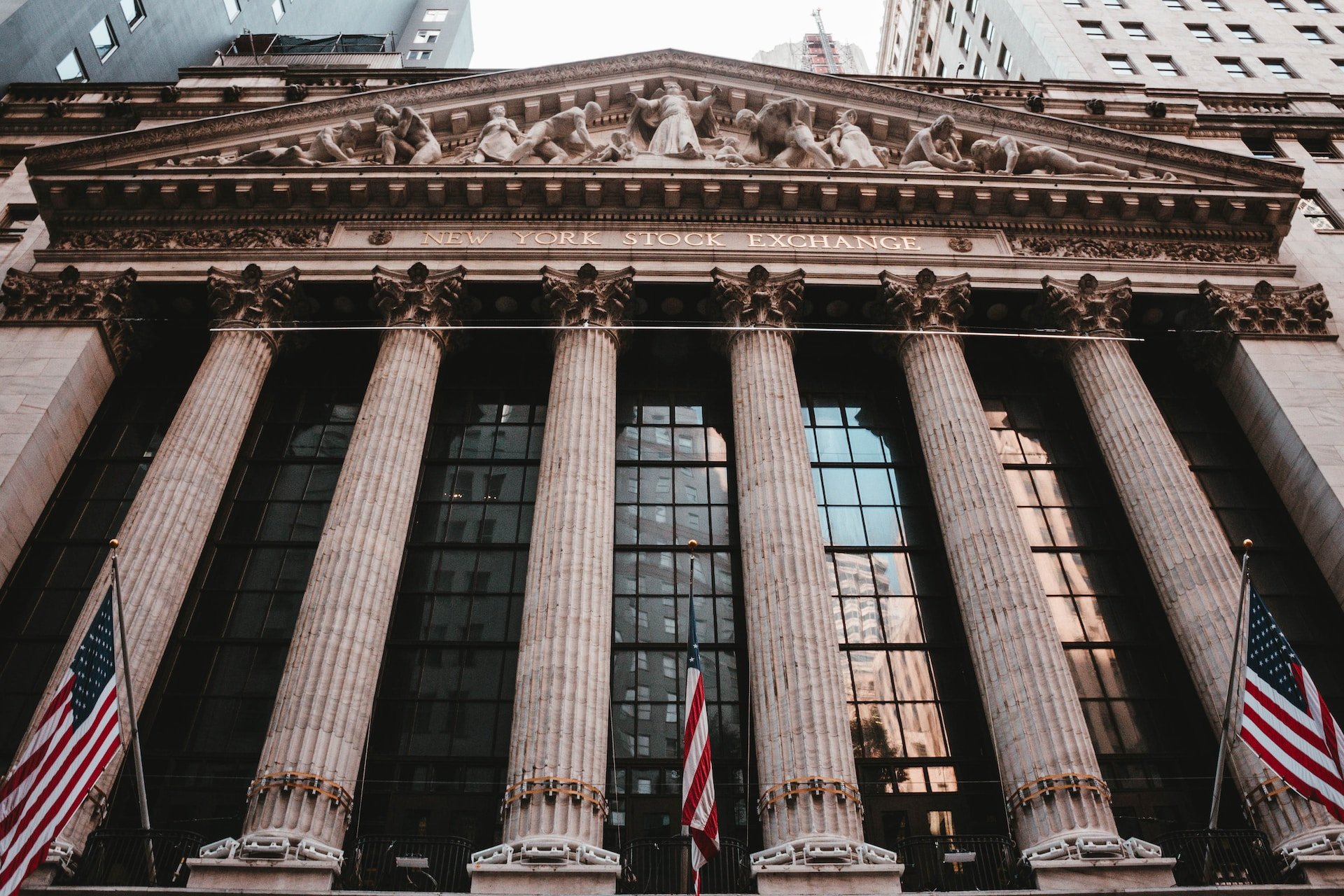
In one sense, the stock market is owned by the individuals who buy shares of publicly traded companies. But these trades most commonly occur on public exchanges such as the New York Stock Exchange or Nasdaq. Who owns the stock market? The answer actually varies between each of the major stock exchanges.
This guide will take a closer look at who owns each of these exchanges and how that can impact the way the stock market works.

Stock Market vs. Stock Exchange
First, it’s important to understand the difference between the stock market and an individual stock exchange — especially if you’re new to investing.
The stock market refers broadly to the securities that investors can buy and sell. A stock exchange is simply a marketplace where these securities are listed and investors can perform trades.
The most common stock exchanges include:
- New York Stock Exchange (NYSE)
- Nasdaq
- Shanghai Stock Exchange
- London Stock Exchange
- Japan Exchange Group
- Bombay Stock Exchange
- Chicago Mercantile Exchange
You’ll notice that not all stock exchanges are domestic. Some investors choose to invest in international companies since these stocks will not be influenced by the same economic forces as American corporations.
Also note that some companies may be listed on multiple exchanges, meaning you might find a company listed on both the NYSE and Nasdaq.
How Stock Exchanges Are Regulated
Historically, stock exchanges operated as self-regulated entities owned and operated by their constituent members — primarily traders, brokers, and market makers.
But in recent years, many of the major exchanges have gone public with an initial public offering (IPO), much like the companies listed on the exchange itself. This means that the major exchanges operate just like publicly traded companies, and it’s possible to trace the ownership of these companies based on who owns the greatest number of shares.
Why It Matters Who Owns the Stock Market
Why does it matter who owns the stock market? For one thing, this information can make you a more knowledgeable investor. But it also has a direct bearing on the way stock exchanges operate. That can include:
- Requiring companies to pay listing fees
- Requiring traders to pay to access market
- Requiring traders to pay transaction fees
It’s rare that these requirements benefit individual investors, but learning about ownership and mergers can help you navigate the challenges of trading — both domestically and in foreign markets.
Who Owns the Stock Market Today?
Who owns the New York Stock Exchange? Who owns Nasdaq? Since each exchange functions the same way as a public company, it’s possible to trace the ownership of each of the major stock exchanges.
Who Owns NYSE?
Who owns the New York Stock Exchange? Originally, the NYSE was owned entirely by its members. But things changed in 2006 when the company went public. This happened after it acquired Archipelago, followed shortly by the acquisition of Euronext (2007), followed by the American Stock Exchange (2008).
Who owns NYSE today? Currently, the New York Stock Exchange is owned by the Intercontinental Exchange (ICE). The World Forum of Exchanges reports that as of 2022, the New York Stock Exchange reached a market capitalization level of $27 billion, making it the largest exchange in the world.
Who Owns Nasdaq?
The public history of Nasdaq is a bit less straightforward than that of the New York Stock Exchange. Initially, Nasdaq sold restricted shares through a private placement offering in the year 2000. But after restrictions expired in 2002, shares began trading on the OTC Bulletin Board.
Nasdaq’s IPO came on February 9, 2005, when it listed shares on its own stock exchange. At the time, it provided an offering of secondary shares at $9 per share.
The World Forum of Exchanges reports that the Nasdaq exchange has a market cap of $19.5 billion, based on data from 2022, and the company also owns the Philadelphia and Boston stock exchanges.
Who Owns the Shanghai Stock Exchange?
The Shanghai Stock Exchange is one of the only stock exchanges to operate as a non-profit organization, and it is easily among the most restrictive when it comes to listing criteria.
But these features must pay off, since the World Federation of Exchanges reports that by April 2022, the Shanghai Exchange had a market cap of $6.6 billion — making it the third largest exchange in the world.
Because it is based in China, the Shanghai Exchange remains fully under government control. It is currently overseen by the China Securities Regulatory Commission rather than a private company or group of investors.
Who Owns the London Stock Exchange?
The London Stock Exchange (LSE) boasts a rich history. The company can trace its origins to a 17th-century coffee house that first began selling an early version of shares in 1698. It wasn’t until the invention of the telegraph (ca. 1840) that things really took off.
Who owns the London Stock Exchange today? It is currently owned by the London Stock Exchange Group and has a $3.4 billion market cap.
In 2019, the Shanghai Stock Exchange and the London Stock Exchange formed a connection to allow international investors to benefit from China’s growth. And, in turn, Chinese investors can buy and sell companies listed on the LSE.
Who Owns the Japan Exchange Group?
Prior to 2013, Japanese investors performed trades on either the Tokyo Stock Exchange or the Osaka Stock Exchange, both of which had been in operation since 1878. But in 2013, these two exchanges merged to form the Japan Exchange Group.
The Japan Exchange Group is itself a publicly traded company as well as the world’s fourth-largest stock exchange, boasting a market cap equal to $6.2 billion.
Most recently, the Japan Exchange Group successfully acquired Tokyo Commodity Exchange, Inc., and from 2019 onward, the company was able to deal in commodity derivatives.
Who Owns the Bombay Stock Exchange and National Stock Exchange of India?
The Bombay Stock Exchange (BSE) is Asia’s first stock exchange, formed in 1875. Today it is owned by brokers, though outside investors and other financial institutions also have a stake in the company.
The National Stock Exchange of India has been demutualized since 2003, and today it largely remains the possession of various banks and insurance companies.
Who Owns the Chicago Mercantile Exchange?
The Chicago Mercantile Exchange (CME) is an exchange that focuses on futures and options trading. The CME offers trades in sectors ranging from agriculture, energy, precious metals, real estate, and foreign exchange trading.
In 2000, the CME officially went public. It also acquired the Chicago Board of Trade and NYMEX, and today it plays a role in futures and derivatives trading across the globe.
What About Over-the-Counter Stocks?
To purchase stocks, you don’t necessarily need to go through one of the major exchanges. You’ll find shares listed on over-the-counter (OTC) markets, such as the popular Pink Sheets.
The problem is that the companies on these OTC markets are not necessarily regulated by the Securities and Exchange Commission (SEC), and the shares themselves have low liquidity, which makes it harder to generate meaningful returns.
That’s why many investors prefer the popular exchanges, which offer larger trading volumes and high liquidity, not to mention better safeguards and regulatory control.

Find Free Stock Picks
No matter what exchange you use, you’ll need the right tools to research and monitor your investments. Gorilla Trades members get exclusive access to advanced resources that you can use to reach your investing potential. Sign up for a free trial and get 30 days of stock picks on us.
